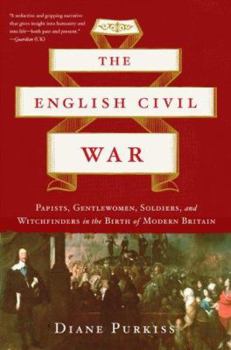The English Civil War: Papists, Gentlewomen, Soldiers, and Witchfinders in the Birth of Modern Britain
Select Format
Select Condition 
Book Overview
In this compelling history of the violent struggle between the monarchy and Parliament that tore apart seventeenth-century England, a rising star among British historians sheds new light on the people who fought and died through those tumultuous years. Drawing on exciting new sources, including letters, memoirs, ballads, plays, illustrations, and even cookbooks, Diane Purkiss creates a rich and nuanced portrait of this turbulent era. The English Civil...
Format:Paperback
Language:English
ISBN:0465067573
ISBN13:9780465067572
Release Date:December 2007
Publisher:Basic Books
Length:680 Pages
Weight:1.70 lbs.
Dimensions:1.6" x 6.4" x 9.2"
Customer Reviews
5 ratings
Fine
Published by SG , 2 months ago
Interesting enough but badly needing the hand of an effective editor. Purkiss relies so heavily upon in-text citations that her writing suffers for it; any given page is composed primarily of block quotes which are minimally expanded upon (if at all) and just repeat a context which has already been elucidated. One gets the impression of a student trying to reach a minimum word count. Furthermore she jumps around chronologies to create an atmosphere of the era (which is effective), but in doing so loses all sense of momentum, story, or personalities involved. Overall the book is just journal entries and letters without anything anchoring them.
Unique and Effective
Published by Thriftbooks.com User , 17 years ago
A fantastic example of a bottom-up history that works. Dr. Purkiss paints a picture of the English Civil War using particular examples and stories from the common man, while keeping clear the role of political events, battles, and "great men". This book provides a detailed account of the causes and implications (without oversimplifying them) of the English Civil War on a grand scale while focusing on the impact it had on the people of England, something that is essential to understanding the period. If you are looking for an account of battles and diplomacy, there are better choices, but if you want to understand the mark the Civil War left on the English people, look no further.
Bit disjointed but still good
Published by Thriftbooks.com User , 18 years ago
I was able to follow the narrative despite the author's focus on accounts of individuals. This focus gave me a better sense of what it felt like to be a participant in the war (whether or not you wanted to be). Also, unlike other books I've read on the English civil war, I was able to get a sense of which events were truly important: the battle of Naseby, for example, was not merely a defeat for the Royalist forces (as was Maston Moor) but a complete route which left the Royalist forces unable to recover. I do think that the book would benefit from a timeline of important events, so that reader can be reminded of the chronological order of vents. Also a list of the important "characters", with short biographies, would be helpful so that the reader is not confused when an eyewitness who has not been heard from in recent pages reappears.
Poorly Written? No, just a different approach
Published by Thriftbooks.com User , 18 years ago
It seems that Christopher Drost didn't really know what he was getting into with Diane Purkiss' new book. One should not read this for a comprehensive linear history of the English Civil War. In fact, there are chapters I breezed through because my interest in certain local details wasn't too high. But the forest-trees issue is precisely the point. For a good sense of the Elizabeth-James transition, one could read Leanda De Lisle's "After Elizabeth"; for the war from Charles' perspective, maybe Pauline Gregg's "King Charles I"; for the aftermath of the commonwealth, maybe Mark Kishlansjy's "A Monarchy Transformed." But these books are all broad-brush looks at how the war was perceived by royalist or Puritan leaders. Purkiss tells us what the war felt like from the ground up, and for that we should be grateful. There really isn't another work on the war that takes this particular perspective.
Fine Book
Published by Thriftbooks.com User , 18 years ago
Although I have read only the first 100 pages, must take strong exception to Mr. Drost's disparaging review. Purkiss has not written what Mr. D. was apparently looking for-- a survey of the English Civil War. I'm not sure if we need another. Rather, Purkiss focuses on the cultural and religious bents of the main and of minor players, working in quirks/deformities inherited from childhood. I mean, for example: (A) the overly rigid personality of Charles I (formed from physical and psychological handicaps and from the good bullying he recv'd from his older brother);(B) the Catholicising, aesthetic and good-time drives of Henrietta Maria (what else from the daughter of Marie di Medici and Henry IV?) and (C) the reforming zeal of Arch Bishop Laud who, while no friend of Rome, feared that England's best and brightest would swim the Tiber were he not to reintroduce, and quickly, some Baroque Pizaz into the Church of England and be seen to curb the Scottish and English parties of the "godly." (A) plus (B) plus (C) plus (D) (the dour, hard-headed and touchy qualities of the "godly," presented in fascinating detail)-- all made for a pretty explosive 17th century mixture! I am starting to feel repeat feel how it all happened. I don't think brain-frying surveys of the English Civil War lay this out half as well as Purkiss has done in her first 100 pages. When I finish, shall report back in case my views have changed. For now, I judge that this is a wonderful book, from cover to cover, starting with the splendid introduction to the 'gentle reader,' lovingly (and cleverly) crafted by Purkiss in the style of her time!







